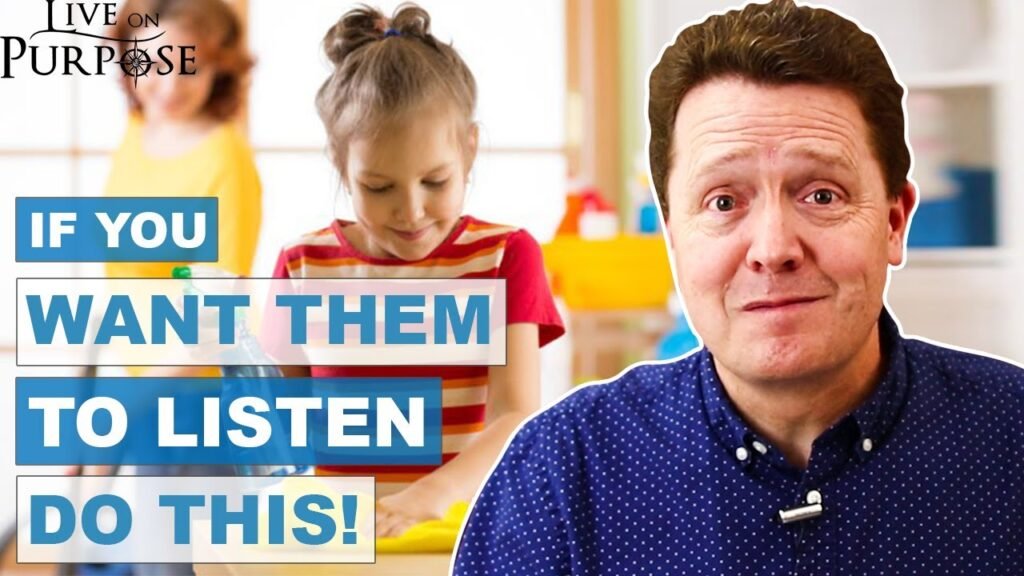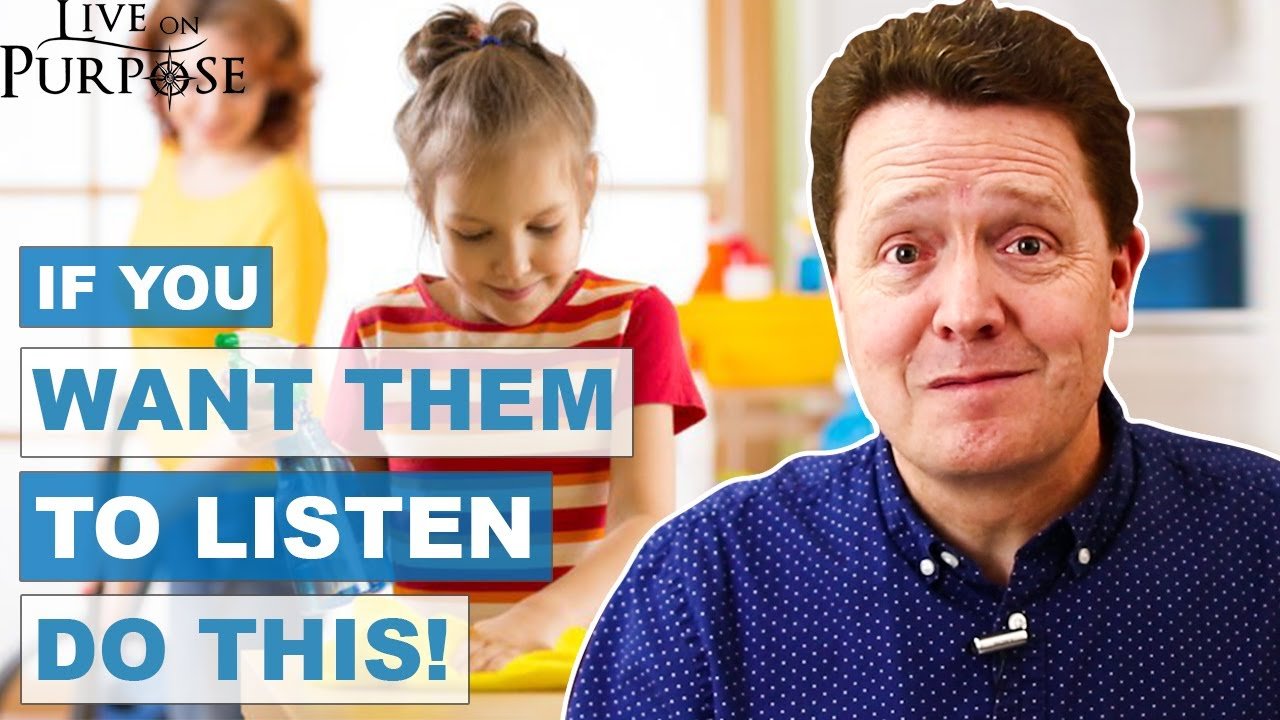Parenting can be challenging at times, especially when trying to get children to listen the first time. Thankfully, Dr. Paul is here with his 5 tips to help make it possible. The first tip is to learn to think like a child and understand why they should listen to you. It’s important to put yourself in their shoes and give them a compelling reason to listen. The second tip is to manage your emotions and approach the situation calmly. By staying in control and coming from a place of calmness, you communicate a sense of power to your child. The third tip is to tie consequences to communication, so that your child understands the importance of listening. The fourth tip is to turn your words into something valuable by connecting them to consequences. This helps increase the value of your words and teaches your child that there are important reasons to listen. And the fifth tip is to work on building a strong relationship with your child based on love and respect. When your child knows that they are loved and that you are more powerful than they are, they are more likely to listen to you. Ready for more positive parenting? Bring Dr. Paul and his wife, Vicki, onto your parenting team with The Parenting Power-up Audio Course. Watch and enjoy the video for a deeper understanding of these tips and check out the description for more resources.

Understanding the Child’s Perspective
As parents, it’s sometimes difficult to grasp why our children don’t listen to us the first time. To effectively communicate with them, we need to put ourselves in their shoes and understand their perspective. It’s important to remember that children have their own thoughts, needs, and desires, which may not always align with ours. By learning to think like a child, we can better understand why they should listen to us and tailor our communication accordingly. Instead of assuming that they should listen simply because we’re adults, we need to provide them with compelling reasons from their own perspective. This involves considering their developmental stage, interests, and motivations. When we can think like a child, we can approach communication in a way that resonates with them and encourages them to respond the first time.
Managing Your Emotions
One of the key factors in getting children to listen to us the first time is managing our own emotions. It’s important to approach situations calmly and with a level-headed mindset. When we let our emotions get the better of us, we lose sight of effective communication and control. When we’re yelling, screaming, or acting out of control, we send a message to our children that we’re not in a position of power or authority. This makes it harder for them to take us seriously and listen to what we have to say. On the other hand, when we approach situations with a calm face, calm voice, and calm body, we communicate a sense of power and control. This helps keep us in a position of authority as parents and increases the chances of our children listening to us the first time.
Teaching the Importance of Listening
In order for children to understand the importance of listening, it’s crucial to tie consequences to communication. By linking their actions to specific outcomes, we can teach them that listening has real-life consequences. This helps them understand that their behavior and willingness to listen directly impact the consequences they experience. Positive reinforcement and rewards can also be effective tools in teaching children the importance of listening. By providing incentives for good listening habits, we create a positive association and motivation for them to listen attentively. It’s important to be consistent in enforcing these consequences and rewards, as this helps children understand that listening is a valued and expected behavior.
Connecting Words to Consequences
To get children to listen to us the first time, we need to turn our words into something valuable by connecting them to consequences. Instead of repeating ourselves and seeing no action, we need to make our words meaningful and impactful. When we consistently pair our communication with tangible consequences, children learn to associate our words with specific outcomes. This helps them understand that listening to us has real consequences, whether positive or negative. By doing so, we increase the value of our words and motivate children to listen attentively from the start. It’s important to avoid empty threats or promises and establish trust through follow-through. When children can trust that our words will be followed by action, they are more likely to take us seriously and respond the first time.
Building a Strong Relationship
A strong and healthy parent-child relationship is essential for effective communication and cooperation. Children are more likely to listen and respond to parents they feel loved and respected by. Building a strong relationship involves investing time and effort into understanding and connecting with our children. It’s important to show them unconditional love and support, no matter what. By consistently demonstrating love, we establish ourselves as a reliable source of guidance and authority. This positions us in a place of influence, making it easier for our children to listen to us the first time. Respect is also a crucial component of a strong relationship. When we respect our children’s thoughts, feelings, and autonomy, they are more likely to reciprocate and respect our authority. By working on building a strong relationship based on love and respect, we set a strong foundation for lifelong listening skills.
Understanding a Child’s Perspective
To effectively communicate with our children, it’s important to understand their thought processes and motivations. Children often think differently from adults, and their priorities and perspectives may not align with ours. By gaining insight into their unique thinking patterns, we can tailor our communication to resonate with them. Additionally, developing empathy allows us to better understand their emotions and needs, leading to more effective and compassionate communication. By putting ourselves in their shoes and considering their developmental stage, interests, and motivations, we can approach communication in a way that feels relevant and relatable to them. This helps create a connection and encourages them to listen and respond.
The Importance of Emotional Management
Emotional management plays a crucial role in effective communication with children. When we can recognize and control our own emotions, we create a calm environment that promotes effective conversation and cooperation. By managing our affect – our feelings and emotions – we are able to approach situations with a level-headed mindset. When we remain calm, children sense our stability and are more likely to feel safe and understood. This allows for open and honest communication and increases the chances of them listening to us the first time. Creating a calm environment also helps children develop their emotional regulation skills, as they learn by example. By modeling emotional management, we teach children the importance of self-control and empathy in their own communication.
Teaching Consequences for Better Listening Skills
Linking actions to outcomes is a powerful way to teach children the importance of listening. By demonstrating that their behaviors and choices have direct consequences, we encourage them to consider the impact of their actions on their own lives and the lives of others. Positive reinforcement and rewards can be effective tools in this process, as they provide an incentive for children to consistently demonstrate good listening skills. By consistently reinforcing positive behaviors and enforcing consequences for negative behaviors, we establish clear expectations and boundaries. Consistency is key in teaching consequences, as it helps children understand that their actions have predictable outcomes. Through this process, children develop the ability to listen attentively and understand the value of effective communication.
Fulfilling the Value of Words
To make our words valuable and motivate children to listen the first time, we need to ensure that our words are meaningful and impactful. Making empty threats or promises only diminishes the value of our communication. Instead, we need to establish trust by following through on our words. When children can trust that our words will be backed by action, they are more likely to take us seriously and respond. This means that we need to be mindful of what we say and avoid making idle threats or promises. By making our words meaningful and connecting them to specific outcomes, we demonstrate integrity and reliability. Establishing this trust helps children understand the importance of listening and the impact it has on their lives.
Conclusion
Implementing these five tips – learning to think like a child, managing our emotions, tying consequences to communication, connecting words to consequences, and building a strong relationship – can lead to improved communication and cooperation from children. By understanding a child’s perspective and developing empathy, we can communicate in a way that resonates with them and encourages them to listen. Managing our emotions and creating a calm environment promotes effective communication and helps children develop their own emotional regulation skills. Tying consequences to communication teaches children the importance of listening, while connecting our words to specific outcomes makes our communication meaningful and impactful. Finally, building a strong relationship based on love and respect establishes a foundation for lifelong listening skills. By practicing these tips, we can enhance our relationship with our children and create a harmonious and cooperative environment in our homes.

